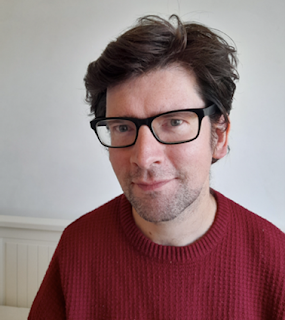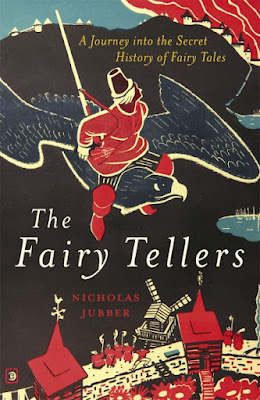On Publication Day of The Fairy Tellers I am delighted to welcome its author
Nicholas Jubber
to tell us more about his book
Welcome to Jaffareadstoo, Nicholas, thank you for spending time with us today. What inspired you to write The Fairy Tellers?
Fairy tales thrilled me in childhood - classics like ‘The Snow Queen’, ‘Rumpelstiltskin’, ‘The Ebony Horse’. I’d imagine myself riding on a reindeer’s back like Gerda or working the levers of the wooden horse like the Arabian prince. As a student, I wrote and put on a play about fairy tale characters, and found these stories were still bubbling in my head. So when, a decade and a half later, I was looking for stories to tell my children, the traditional tales weren’t very far out of mind. But now I was itching with a particular question: who were the people behind these tales? This question came partly from my lifelong interest in fairy tales, and partly from my curiosity about what goes on behind the scenes - whether it’s at the theatre, movies or anything else. So that set me on a quest to learn about some of the long-ago tellers of tales and the lives they led.
Where was your starting point? And how did you decide which fairy tellers to write about?
There were so many potential starting points, such as the first written ‘Western’ fairy tale, from 2nd century North Africa, or a 9th century Chinese version of Cinderella, or a medieval Indian story collection - which features prominently in the book. But I decided to start in Naples with Giambattista Basile, a charismatic storyteller who was kicked around the courts of 17th century Italy, often in the wake of his singing sensation sister Adriana. Giambattista’s book, The Tale of Tales, is a charming and often surprising anthology of fairy tales, and it’s the first written European fairy tale collection, with early versions of iconic tales such as ‘Cinderella’, ‘Sleeping Beauty’ and ‘Rapunzel’, so I felt it was a good entry point. Plus, Giambattista’s world is still wonderfully accessible: for all that Naples has changed over the centuries, the raucous atmosphere of his time still hums through its streets.
As for choosing which fairy tellers to write about - this came about organically. I wanted to cover a wide spectrum of the world and a wide spectrum of stories. I was keen to include a range of tellers, women and men, people from different social and ethnic backgrounds, and people who covered different angles on ‘fairy-telling’ - inventors of tales like Hans Christian Andersen, collectors of tales like Ivan Khudiakov, and the sources who told tales to collectors, like Dortchen Wild. I spent a lot of time thinking about this selection, so I hope it offers the reader a varied and interesting cross-section of fairy tale history.
What were the challenges?
I had already done a lot of travel and research when the pandemic struck. In early 2020, I’d been travelling between Italy, France and Germany, and was attending a witches’ festival in the Black Forest, when I learned that Northern Italy had transformed into a central zone of the virus. The lockdowns forced me to change many of my plans. I found myself looking back at notes from travels in places like Kashmir and Syria, exploring the lives of storytellers like the medieval Indian poet Somadeva and the 18th century teller of ‘Aladdin’, Hanna Dyab, through my jottings from those journeys. I sought out experts around the world, received documents from Delhi, Berlin and Kiev, and spoke via Zoom to scholars and storytellers in America, India, Egypt, Russia and many other places, people who might have been harder to get hold of if they hadn’t been, like me, stuck at home. So, whilst it was a tricky time to write a book (especially with homeschooling two small children!), there were also opportunities that I might not have found if circumstances had been different.
In your research did you find anything that surprised you?
Lots of things surprised me. For example, discovering that the Italian storyteller Giambattista Basile drank at the same Neapolitan taverna around the same time as the painter Caravaggio, who was wounded there in the early 17th century; or that Hans Christian Andersen visited the Brothers Grimm in Berlin and was very disappointed when Jacob Grimm admitted he’d never heard of him. These connections, joining up storytellers and other artists around the world, really fascinated me, as did the ways their lives were affected by the big events going on in the world around them - the impact of the Napoleonic Wars on the work of the Brothers Grimm, for example, as well as on the life of Hans Christian Andersen. Perhaps the biggest surprise was the life of the Russian storyteller Ivan Khudiakov. I’d originally planned to write about a completely different Russian storyteller, but when I started learning about Ivan’s extraordinary life - tramping around the villages of Russia in search of tales, and involving himself with ‘nihilists’ bent on assassinating the Tsar - I knew I’d have to scrap my previous plans and find out more about this strange, tragic figure. Many of the tales he collected lead to the macabre witch Baba Yaga and her hut on chicken legs, but in many ways Ivan’s life was even stranger, and darker!
Do you have a favourite fairy tale?
It’s hard to pick out one favourite! There are so many and I’ve been really excited by many tales that I didn’t know about before. But the one that’s stuck deepest inside me is ‘The Snow Queen’. I love the journey Gerda undertakes to rescue her friend Kai. As a child I dreamed of travelling by reindeer across Lapland like Gerda. On my journey, I got to meet a reindeer herder in Lapland and spend some time with his herd, and I also interviewed ballet performers in Copenhagen who were putting on a production of ‘The Snow Queen’. The costumes and sets were designed by Queen Margrethe, and I learned from the director of the show that ‘The Snow Queen’ is her favourite fairy tale too!
What do you hope readers will take away from The Fairy Tellers?
I hope readers will be introduced to many tales that haven’t been given the attention they deserve - wonderful tales like ‘The Flea’, about a princess forced to marry an ogre and how she escapes; or ‘The Golden City’, a mesmerising Indian tale about a gambler who sets out on an adventure in search of a mythical city, getting swallowed by a giant fish and riding a magical talking bird along the way. I hope they’ll feel they’ve dipped into the lives of the people behind these tales, and experienced the worlds they came from, and that they’re as excited as me by the way these stories connect around the world.
How can readers find out more about you and your work?
You can find out more at my website www.nickjubber.com, or you can follow me on twitter @jubberstravels or see pictures from my travels on instagram - nick.jubber. I’m also hoping to do lots of talks and events about The Fairy Tellers, and I’ll be posting information about that on my website.
The Fairy Tellers: A Journey into the Secret History of Fairy Tales is published by John Murray Press, priced at £20 and available online and from all good bookshops.
Nicholas Jubber has travelled in the Middle East, Central Asia, North and East Africa and across Europe. Along the way, he has worked as a teacher, carpet-washer and even had a stint as a tannery assistant. He has written three previous books, The Timbuktu School for Nomads, The Prester Quest (winner of the Dolman Travel Book Award) and Drinking Arak off an Ayatollah's Beard (shortlisted for the Dolman Award). He has written for numerous publications, including the Guardian, Observer, Globe and Mail, Irish Times and BBC History.
Twitter @jubberstravels #TheFairyTellers
@BookPublicistUK
Huge thanks to Nicholas for spending time with us today.
We wish you good fortune with your book.




No comments:
Post a Comment
Thank you for taking the time to comment - Jaffareadstoo appreciates your interest.